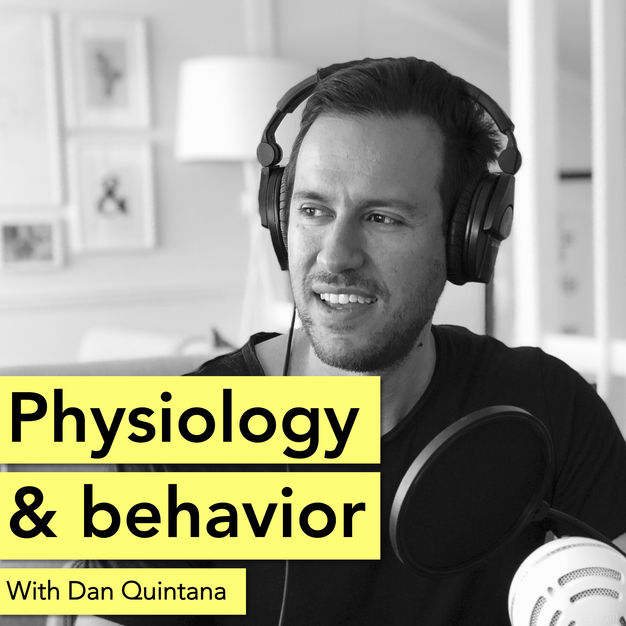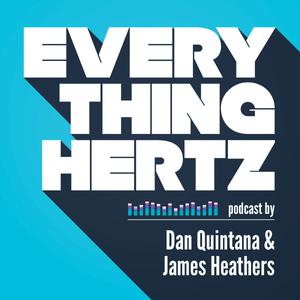
Physiology and Behavior
Dan Quintana
Dan Quintana is a scientist trying to better understand how our physiology influences behaviour. On this show you'll find a mix of episodes on research that's catching Dan's eye in biological psychology, interviews with other scientists, and Dan sharing his daily research process.
- 57 minutes 18 secondsReproducible science, social media, and responding to reviewer commentsIn this episode I chat with Izelle Labuschagne, who is the founder of the Complete Thesis support group, about reproducible science [3:42], social media for academics [21:20], and responding to reviewer comments [39:25].
Hosted on Acast. See acast.com/privacy for more information.
15 November 2021, 6:51 pm - 12 minutes 41 secondsAudio paper: How podcasts can benefit scientific communitiesThis is the audio version of a paper I recently co-authored in Trends in Cognitive Sciences, titled "How podcasts can benefit scientific communities". I'm reading the preprint version of the article, which is very similar to the published version.
Hosted on Acast. See acast.com/privacy for more information.
27 January 2021, 10:43 pm - 14 minutes 49 secondsSocial media for academics: why and how
This was a talk I recently did on social media for academics. I cover both why and how academics can use social media to boost their academic careers. The slides are available here.
Enjoy!
Hosted on Acast. See acast.com/privacy for more information.
21 January 2021, 12:18 pm - 35 minutes 48 secondsAudio paper: An Allostatic Theory of Oxytocin
This episode is the audio version of our paper, titled "An Allostatic Theory of Oxytocin", that was recently published in Trends in Cognitive Sciences.
Here is the abstract:
Oxytocin has garnered considerable interest for its role in social behavior, as well as for the potential of intranasal administration to treat social difficulties. How- ever, current theoretical models for the role of oxytocin in social behavior pay little consideration to its evolutionary and developmental history. This article aims to broaden our understanding of the role of oxytocin in social behavior by adopting an ethological approach through the lens of Nikolaas Tinbergen’s 'four questions' – how does oxytocin work; how does the role of oxytocin change during development; how does oxytocin enhance survival; and how did the oxytocin system evolve? We argue that oxytocin is most accurately described as an allostatic hormone that modulates both social and non-social behavior by maintaining stability through changing environments.
Hosted on Acast. See acast.com/privacy for more information.
8 May 2020, 12:37 pm - 44 minutes 1 secondFrom the lab to your living room
This is a virtual talk I recently gave to PhD students at Linköping University on how to better adjust to working from home
The video and the slides from this talk can be found here.
Hosted on Acast. See acast.com/privacy for more information.
9 April 2020, 7:04 am - 2 minutes 10 secondsHow to make ten pieces of content to share across social platforms from just one idea
The main hesitation I hear from researchers when it comes to social media is that they've got nothing to share. In this short clip, I show you can you can share ten different bits of information, across different platforms, using just one idea.
Here's the video version of this clip.
Hosted on Acast. See acast.com/privacy for more information.
28 February 2020, 12:30 pm - 15 minutes 30 secondsThe tools you need to start your own podcast
This podcast episode is about starting your own podcast!
Here are some of the links, services, and products that I mention:
- The mega microphone review from Marco Arment
- Audio-Technica ATR2100-USB Cardioid Dynamic USB/XLR Microphone
- Fireside podcast hosting
- Acast podcast hosting
- Anchor podcast hosting
- Auphonic audio editing
- Izotope RX audio editing
- OBS screen recording software
- eCamm screen recording software
- Share video clips previews using Headliner
Hosted on Acast. See acast.com/privacy for more information.
4 December 2019, 9:42 pm - 59 minutes 17 secondsImproving the precision of oxytocin research | A talk at the University of Copenhagen
This is a talk a recently gave at the university of Copenhagen in which I discuss ways we can improve the precision of oxytocin research.
Download the slides here.
Here is the talk abstract:
The neuropeptide oxytocin has garnered considerable interest for its role in social behavior and its potential for the treatment of psychiatric illnesses characterised by social dysfunction. However, initial excitement has turned to disappointment with some studies failing to replicate earlier results, which has been attributed to issues surrounding research methods, mechanistic understanding, and theory development. In this talk, I will discuss efforts to improve research design to enhance reproducibility, including precise sample size estimation, synthetic datasets, and ways to test evidence for null models. I will also describe two lines of research aiming to better understand oxytocin signalling mechanisms: i) Research identifying whole brain voxel-by-voxel gene expression patterns of the oxytocin receptor (OXTR) gene and its association with mental states via a large-scale fMRI meta-analysis of 14,371 studies and ii) data from two clinical trials demonstrating that compared to placebo, 8IU intranasal oxytocin (but not 24IU intranasal oxytocin or 1IU intravenous oxytocin) modulates social cognition, pupil diameter, and neural activity. Altogether, these studies provide the first steps towards identifying targets for oxytocin receptor engagement in the human brain and suggest that a lower 8IU intranasal dose might be more efficacious than the conventional 24IU dose. I will close by presenting my new theory of oxytocin’s role in human behaviour, which proposes that oxytocin modulates both social and non-social behaviour to maintain stability in changing environments.
Hosted on Acast. See acast.com/privacy for more information.
27 November 2019, 10:18 pm - 13 minutes 42 secondsClinical trial reporting in anorexia nervosa | An interview
In this episode, Dan shares some audio from a recent interview that he did on his recent paper examining clinical trial reporting in anorexia nervosa studies.
-----
Hosted on Acast. See acast.com/privacy for more information.
31 October 2019, 10:30 am - 29 minutes 48 secondsOpen access | A keynote talk at the NFIF annual meeting
In this talk, I share how open access benefits society, your research, and science.
Find the slides here.
Hosted on Acast. See acast.com/privacy for more information.
27 May 2019, 7:35 pm - 2 minutes 10 secondsA pre-registered study on the causal link between intranasal oxytocin and spiritual experiences | Study summary
A 2018 study that provides mixed support for a causal link between single dose intranasal oxytocin and spiritual experiences
-----
Hosted on Acast. See acast.com/privacy for more information.
22 April 2019, 8:26 am - More Episodes? Get the App
Your feedback is valuable to us. Should you encounter any bugs, glitches, lack of functionality or other problems, please email us on [email protected] or join Moon.FM Telegram Group where you can talk directly to the dev team who are happy to answer any queries.
 Everything Hertz
Everything Hertz
 The Bayes Factor
The Bayes Factor
 Human Behavior
Human Behavior
 ReproducibiliTea Podcast
ReproducibiliTea Podcast
 Criminal Behaviorology
Criminal Behaviorology